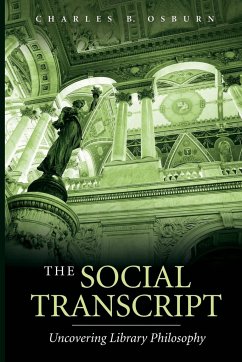Many glimpses into what might be called library philosophy are scattered throughout the literatures of library history and library and information science, but none has coalesced as yet. Conversely, theories relative to the operation of libraries, rather than relative to why its operations are necessary in the first place, are exceedingly abundant. Not surprisingly, fundamental misunderstandings are shared among public, scholar, and librarian about what the library is and why it exists. Adapting the work of Kenneth Boulding, Osburn presents a cogent, well substantiated explanation of why the library refuses to cede its position as a cultural icon; and how it not only continues but flourishes throughout the trials and errors of civilization. The written record of the human race, as we find it in the great libraries, is a precious heritage of communication and profoundly affects the content of what we have to communicate about. Indeed, we stand on the shoulders of the past through its records. -Kenneth Boulding. On the one hand, the concept of a library reflects a rational social process, its genesis and survival the result of each succeeding generation embracing the same core values as the one before. At the same time, practice in the library is bounded by both the experiences and expectations of the public, and our choice and treatment of topic in our scholarly and professional literature. Not surprisingly, fundamental misunderstandings are shared among public, scholar, and librarian about what the library is and why it exists. Adapting the work of Kenneth Boulding, Charles Osburn presents a cogent, well substantiated explanation of why the library refuses to cede its position as a cultural icon; and how it not only continues but flourishes throughout the trials and errors of civilization.
Hinweis: Dieser Artikel kann nur an eine deutsche Lieferadresse ausgeliefert werden.
Hinweis: Dieser Artikel kann nur an eine deutsche Lieferadresse ausgeliefert werden.








